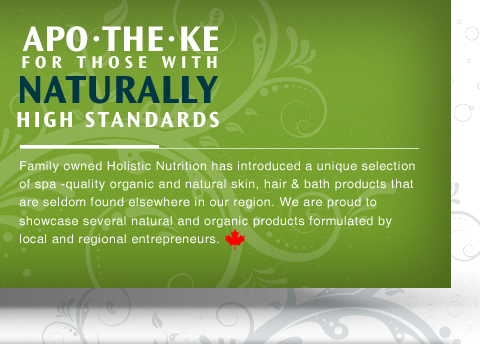|
We're so excited to introduce you to Holistic Nutrition's newest member: Andrea Hauser, BA(H.Kin.), DHMHS
Andrea Hauser is a Classical Homeopath and Darkfield Microscopist who has held a lifelong passion and interest for health and healing. She is a dedicated and compassionate practitioner that has been consulting individuals, families, and other healthcare providers in KW since 2010. She holds a professional membership with the Ontario Homeopathic Association (OHA) and sat on the OHA Board of Directors from 2010-2012. She has also been a part of the Ontario College of Homeopathic Medicines' (OCHM) teaching faculty for the past 3 school year.
Her Stance on Waging War Against Sugar?

During the summer months (much like during the winter holiday season) we are all bombarded with a vast amount of sweet-summer treats. From ice-cream and popsicles to fancy drinks, sugar seems to be the theme of the summer. Have you ever stopped and wondered what the implications of consuming large quantities of sugar are on your health?
Canadians sure have a taste for sweet; sugar is North America’s most popular food additive. The use of sugar has increased from about 15 pounds per person per year in 1815 to about 120 pounds per person at present, an eight-fold increase in 150 years. In other words, the majority of people eat their weight in sugar each year. This equals to more than one teaspoonful every hour, day and night. And it is easy to see how we consume such a large amount of sugar when we consider that the average can of soda contains 10-12 teaspoons of sugar alone!
So what is the problem with eating too much sugar? First of all take a look at the nutrition table on any product containing sugar you may have lying around and you will quickly notice that there is no ‘% daily value’ written under the sugar subtitle. This is because there is no daily recommended amount of sugar; refined sugar intake is not part of our necessary daily nutrient intake!
Sugar is a refined product that has been processed and stripped, consisting essentially of ‘empty’ calories. Sugar is a carbohydrate, therefore consumption of sugar satiates the bodies hunger for carbohydrates, but since it is devoid of minerals and nutrients it leaves a very real need for other nutrients. These needs go unmet as sugar contains no protein, no vitamins, and no fat or fibre. Therefore, as sugar eating becomes a habit, the supply of vitamins, minerals, fats and protein gradually become depleted, and such nutrients must be pulled from tissues elsewhere in the body in order to continue support of the metabolic activities fuelled by the sugar. According to Health Canada people who need to eat fewer calories may want to limit their sugar intake. They continue by stating, foods high in added sugars contain calories but often fewer other nutrients like vitamins or minerals.
Furthermore, when such concentrated sweets are taken alone, they are absorbed rapidly by the body and this results in an immediate rise in blood sugar which is dangerous for everyone, especially diabetics. Additionally, a “heavy intake of table sugar has been shown to be associated with high levels of blood fats such as triglycerides and cholesterol”1.
Did you know that sugar suppresses your immune system? Studies show that consumption of sugar leads to decreased activity in white blood cells (cells involved in immunity). And here are some other ways that sugar can negatively affect your health: it contributes to hyperactivity, anxiety, & depression; causes concentration difficulties; reduces helpful high density cholesterol (HDL’s) and promotes an elevation of harmful cholesterol (LDL’s); it may cause hypoglycaemia; increased fasting blood glucose levels and promotes tooth decay; it produces an acidic stomach; causes headaches; and alters the mind’s ability to think clearly.
So what can we do to improve our diet and decrease our sugar intake? It is important to note that a diet rich in whole grains and other complex carbohydrates, vegetables, and protein foods can help stabilize blood sugar and minimize the desire for sugar. Specifically, eating a diet that focuses on protein and vegetables is a good way to minimize sugar cravings. And how about trying some natural sweeteners in your cooking & baking?
Stevia
Stevia is a small plant with leaves which are 30 times sweeter than sugar. It is sweet with no calories, no carbohydrates, and is diabetic safe. It nourishes the pancreas and does not raise blood glucose levels, making it not only safe for diabetics but also beneficial. Studies have also indicated that stevia tends to lower elevated blood pressure but does not seem to affect normal blood pressure. Stevia is an exceptional aid in weight loss and weight management because it contains no calories and reduces one’s craving for sweets and fatty foods.
Coconut Sugar
Coconut Sugar is a simple cane sugar alternative is naturally low on the glycemic index (GI), which has benefits for weight control and improving glucose and lipid levels in people with diabetes.
Honey
Honey, although a natural product and very tasty, it is important to remember that honey has the highest calorie content of all sugars with 65 calories / tablespoon, compared to the 48 calories found in table sugar. So if weight loss is a concern of yours, use in moderation.
Also try brown rice syrup, date sugar, and pure maple syrup as sugar substitutes, which are a major step up nutritionally from white sugar.
Overall, it is best to obtain our sweet flavour from foods. Most fruits, vegetables, and grains are considered sweet foods.
Here are some good foods to replace sugar treats: homemade popsicles, fresh fruits, almond butter, protein smoothies, vegetable sticks, popcorn, peanut butter, unsweetened granola, almonds, mixed nuts, pumpkin seeds, salads, peanuts, sunflower seeds, and unsweetened muesli.
Remember, too much sweetener in any form can have a negative effect on our health; this includes not only refined sugar, but also corn syrup, honey, and fruit juices, and treats such as sodas, cakes, and candies. Enjoy the summer but strive to find the sweetness you desire from naturally sweet foods and try to incorporate natural sugar substitutes rather than refined sugars into your diet. Your body will thank you later!
References
1. Roberts, A. Effects of a surcrose free diet on the serum-lipid levels of men. Lancet, June 2, 1973
Andrea's Detox Tip:
Use the Buddy system! It is always best to detox with a partner, whether a friend or your health care practitioner. A partner helps you keep motivated and allows you to share your cleansing experience.
|




